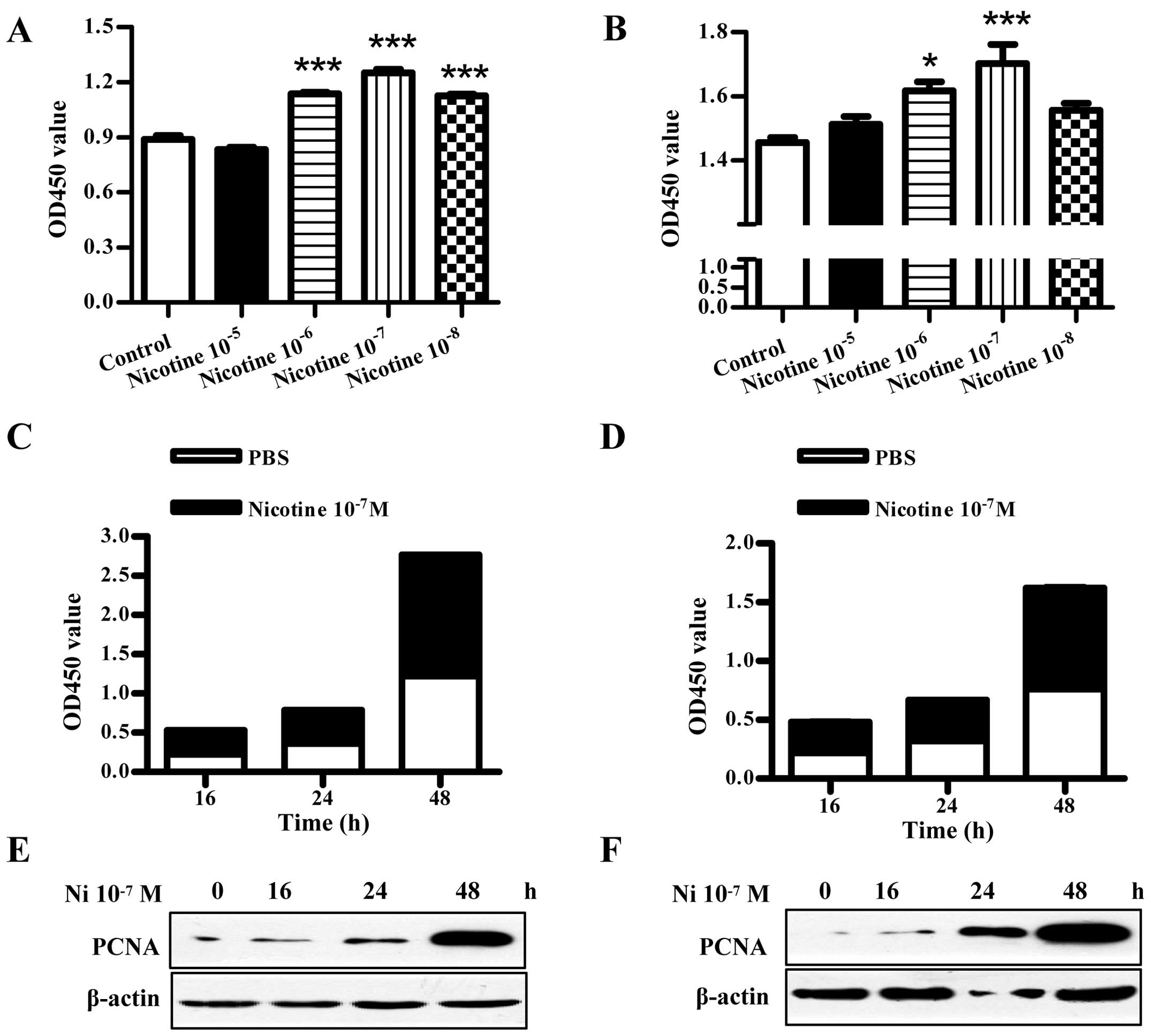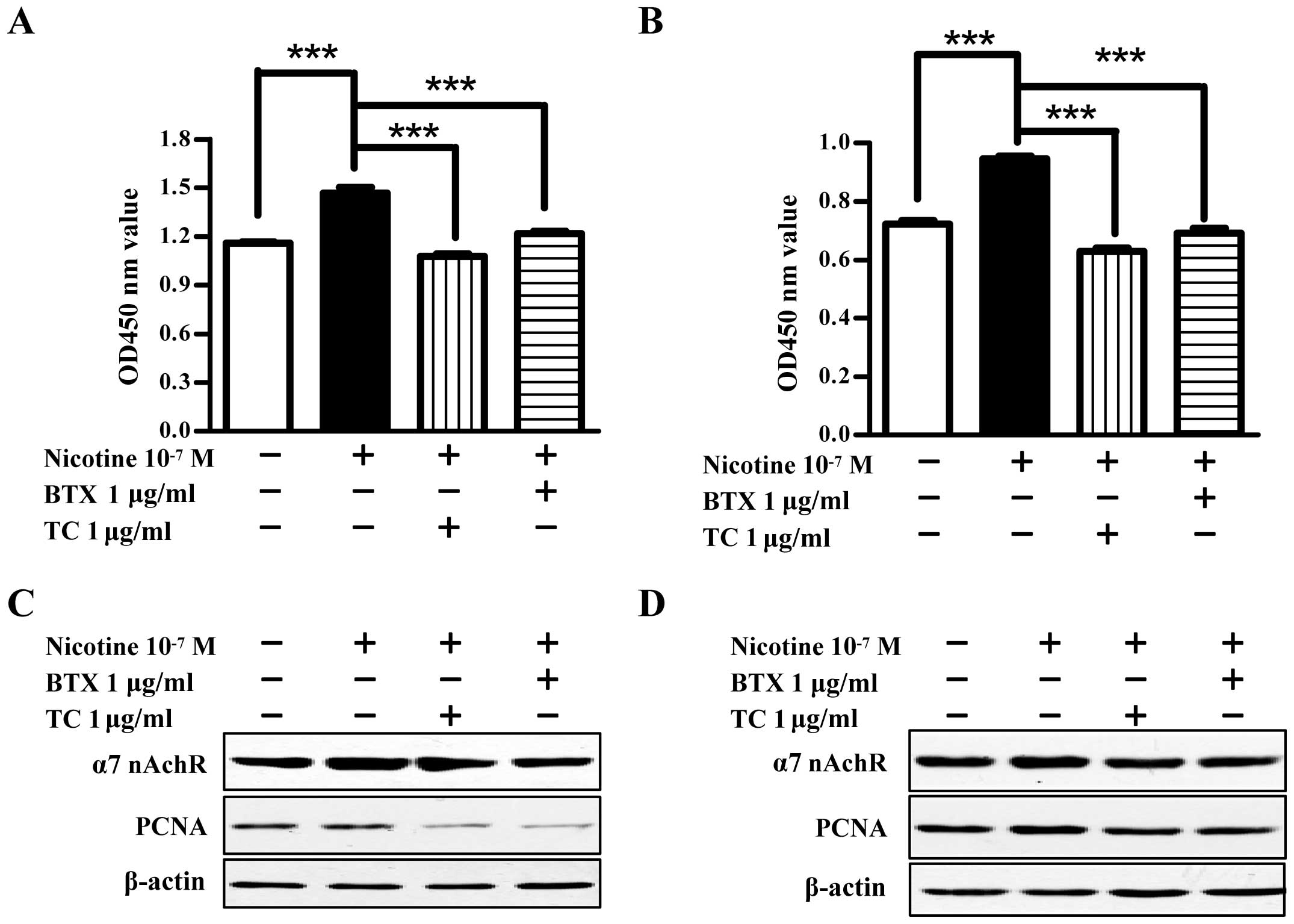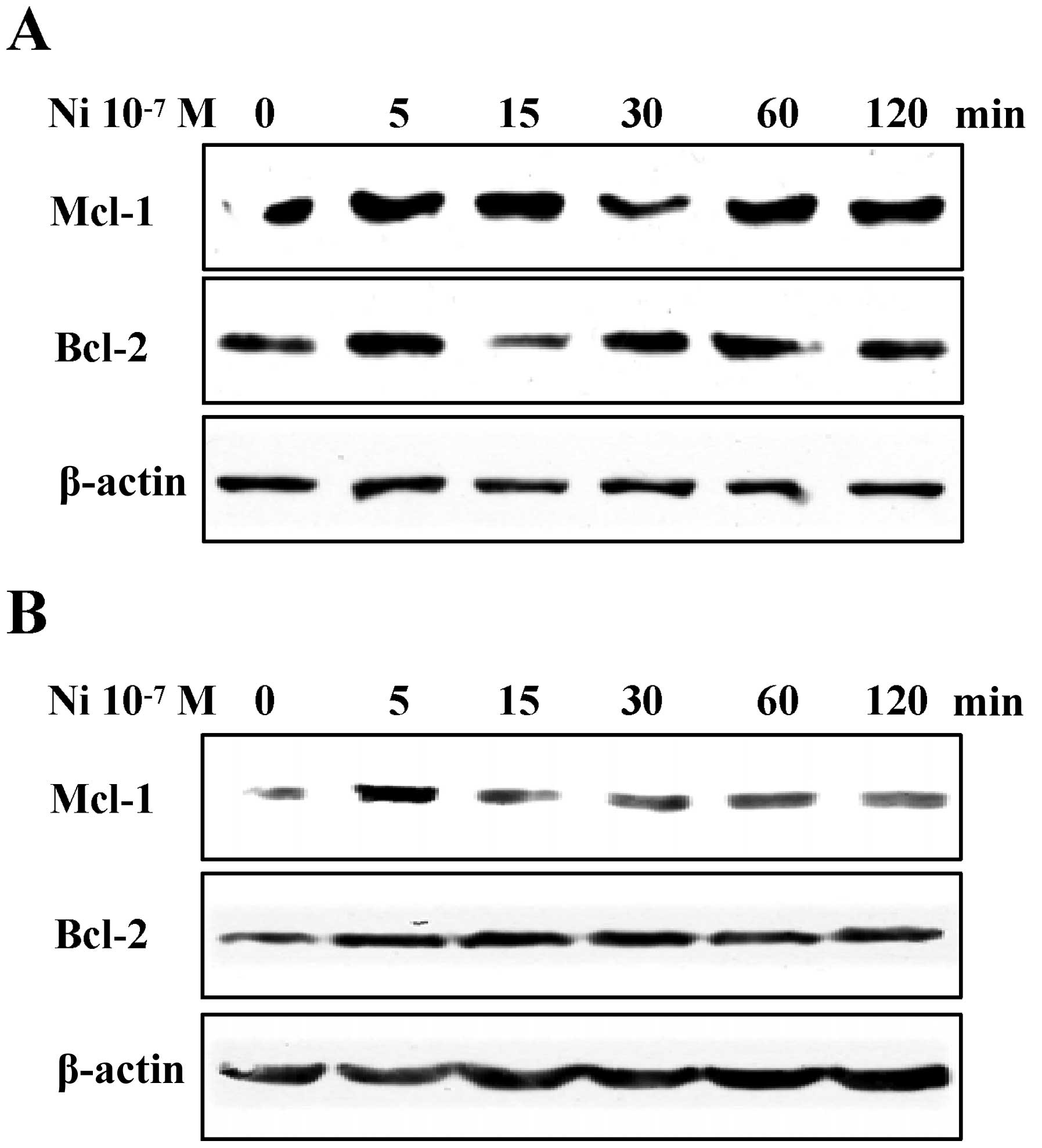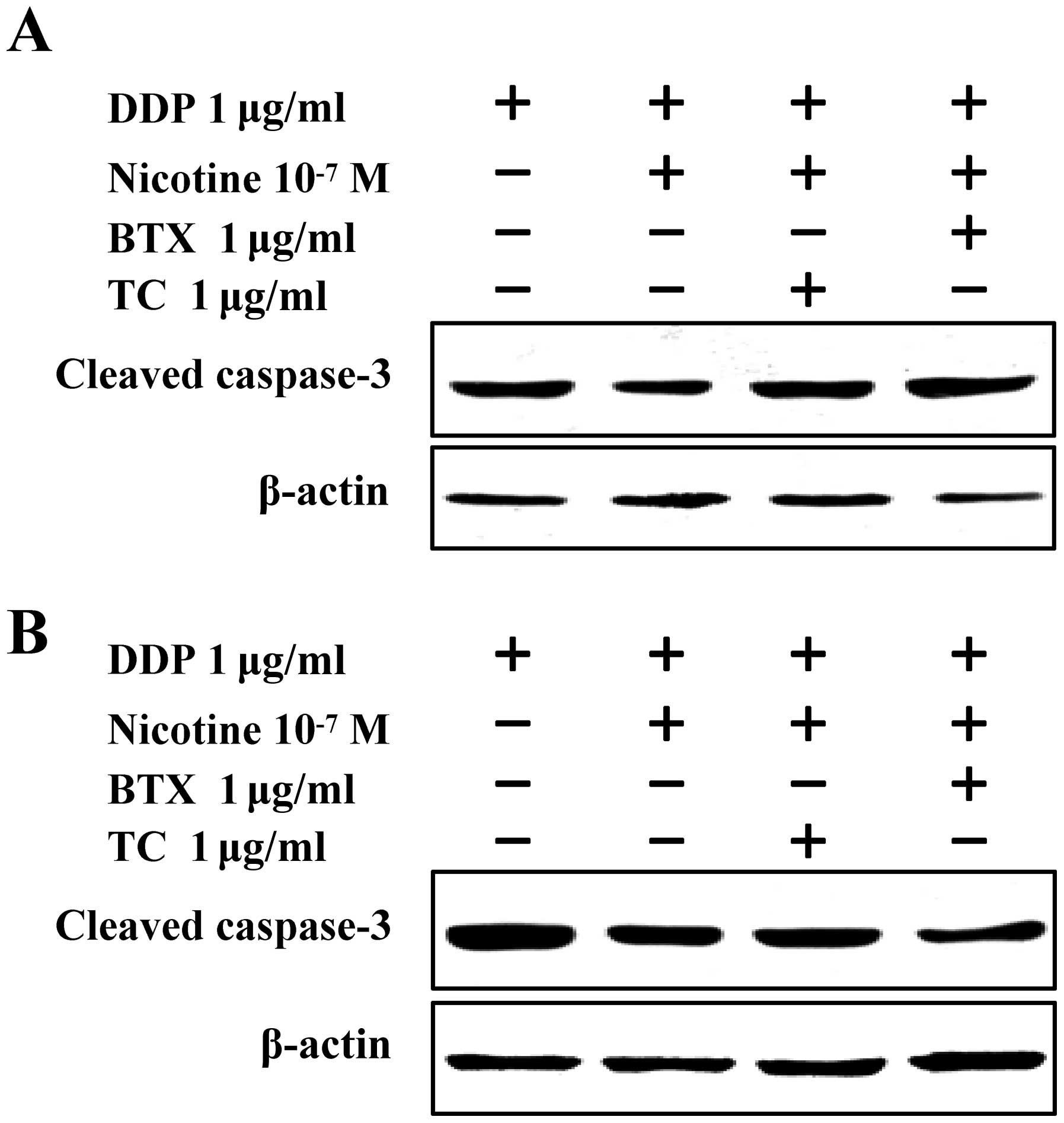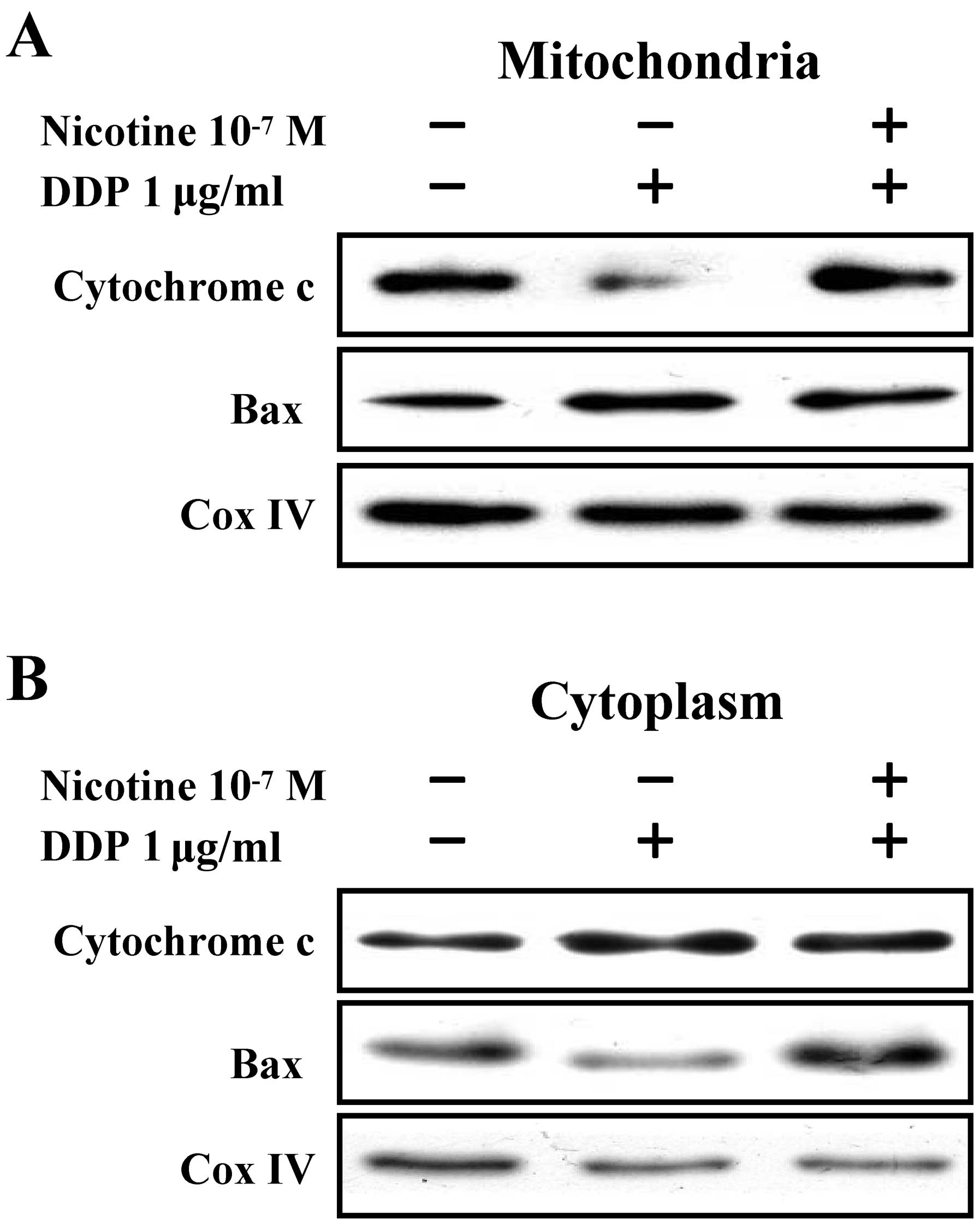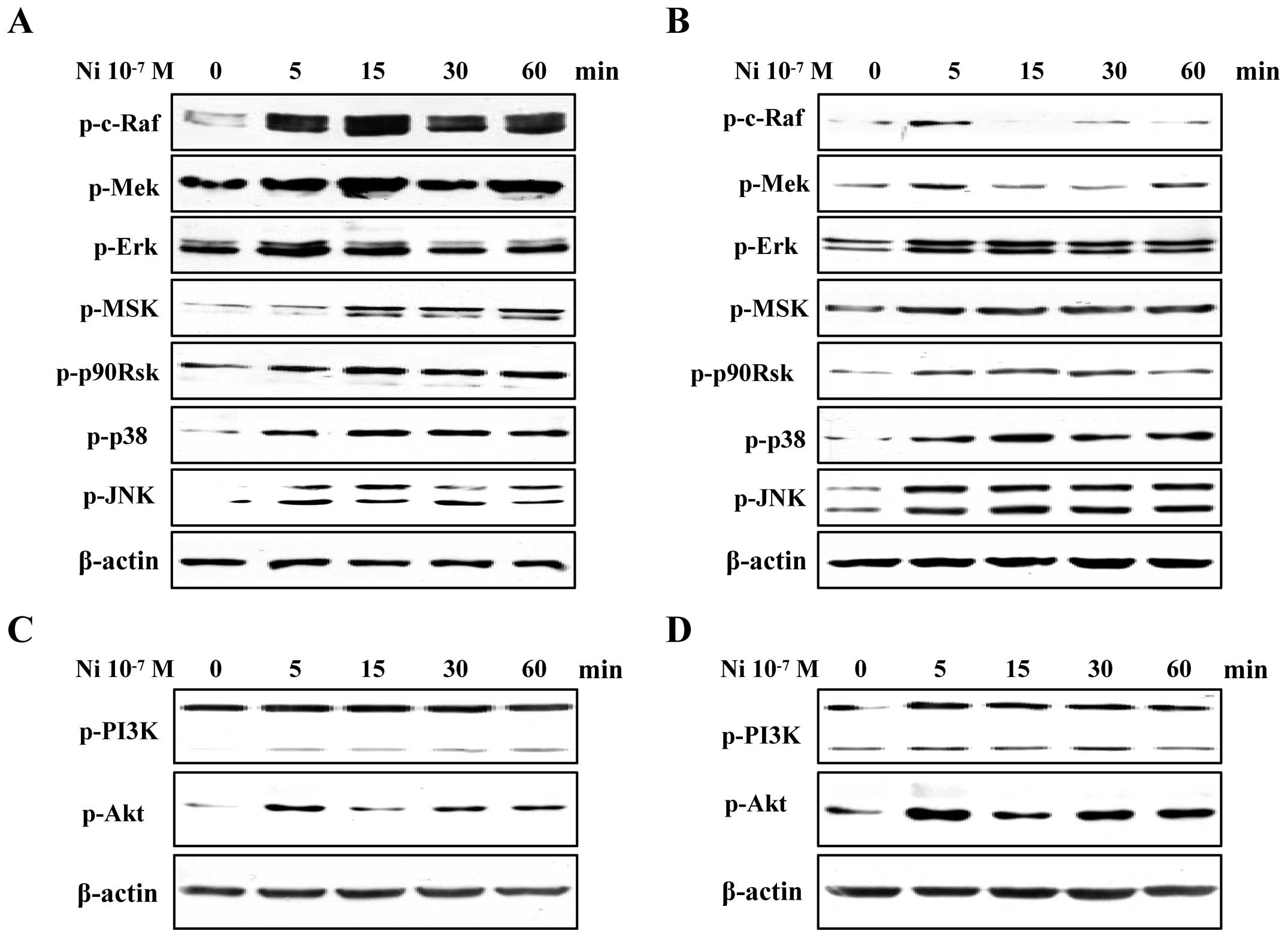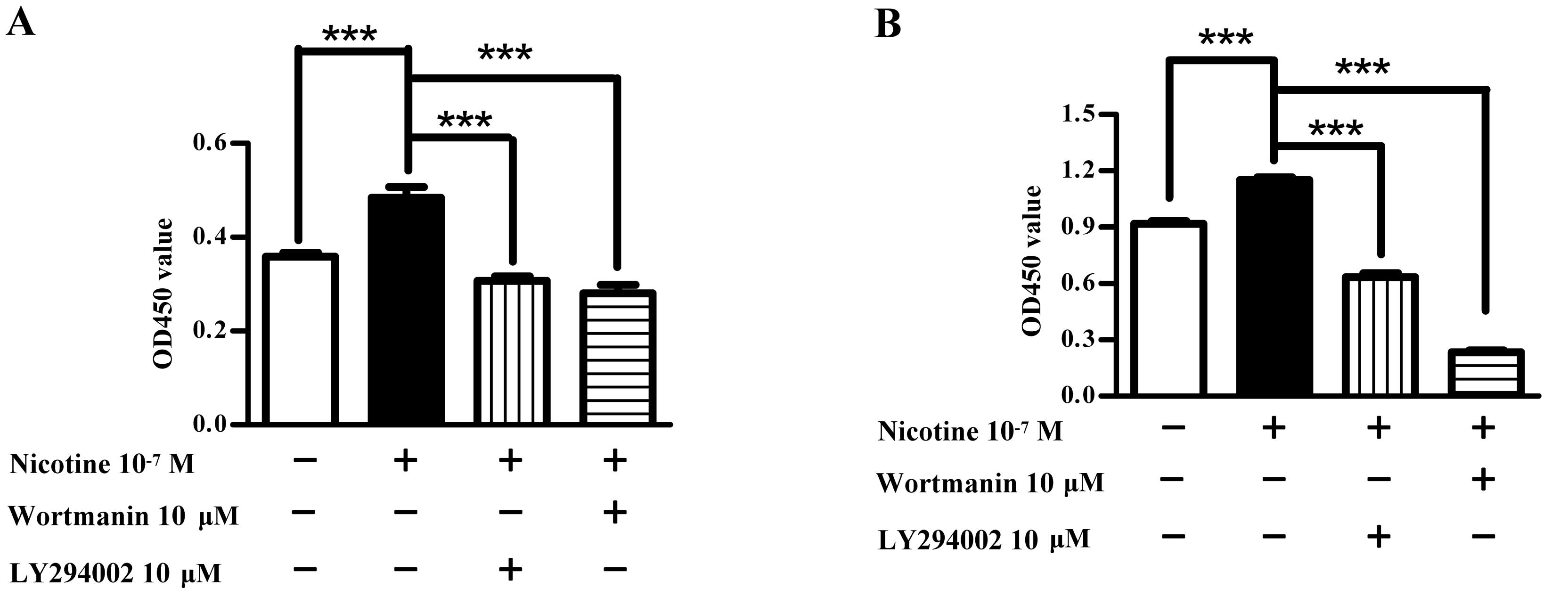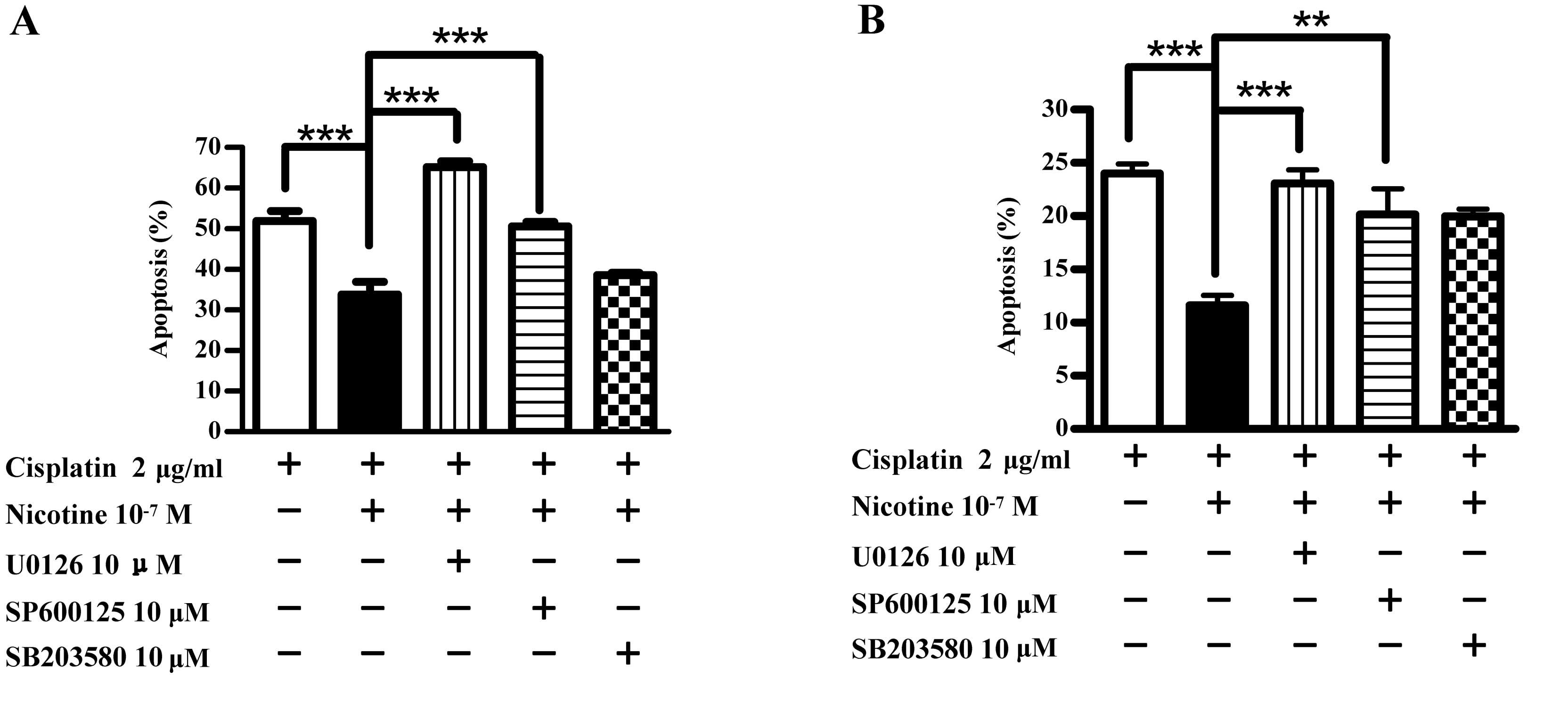|
1
|
Printz C: Gap narrows in African American
smoking-related cancers, increases in breast and colorectal
cancers. Cancer. 117:23572011. View Article : Google Scholar : PubMed/NCBI
|
|
2
|
Li S, Peng Q, Chen Y, You J, Chen Z, Deng
Y, Lao X, Wu H, Qin X and Zeng Z: DNA repair gene XRCC1
polymorphisms, smoking, and bladder cancer risk: a meta-analysis.
PLoS One. 8:e734482013. View Article : Google Scholar : PubMed/NCBI
|
|
3
|
Albuquerque EX, Pereira EF, Alkondon M and
Rogers SW: Mammalian nicotinic acetylcholine receptors: from
structure to function. Physiol Rev. 89:73–120. 2009. View Article : Google Scholar : PubMed/NCBI
|
|
4
|
Cardinale A, Nastrucci C, Cesario A and
Russo P: Nicotine: specific role in angiogenesis, proliferation and
apoptosis. Crit Rev Toxicol. 42:68–89. 2012. View Article : Google Scholar : PubMed/NCBI
|
|
5
|
Tournier JM and Birembaut P: Nicotinic
acetylcholine receptors and predisposition to lung cancer. Curr
Opin Oncol. 23:83–87. 2011. View Article : Google Scholar : PubMed/NCBI
|
|
6
|
Guo L, Li L, Wang W, Pan Z, Zhou Q and Wu
Z: Mitochondrial reactive oxygen species mediates nicotine-induced
hypoxia-inducible factor-1α expression in human non-small cell lung
cancer cells. Biochim Biophys Acta. 1822:852–861. 2012.PubMed/NCBI
|
|
7
|
Jin HJ, Li HT, Sui HX, Xue MQ, Wang YN,
Wang JX and Gao FG: Nicotine stimulated bone marrow-derived
dendritic cells could augment HBV specific CTL priming by
activating PI3K-Akt pathway. Immunol Lett. 146:40–49. 2012.
View Article : Google Scholar : PubMed/NCBI
|
|
8
|
Jin HJ, Sui HX, Wang YN and Gao FG:
Nicotine up-regulated 4-1BBL expression by activating Mek-PI3K
pathway augments the efficacy of bone marrow-derived dendritic cell
vaccination. J lin Immunol. 33:246–254. 2013. View Article : Google Scholar : PubMed/NCBI
|
|
9
|
Gao FG, Wan DF and Gu JR: Ex vivo
nicotine stimulation augments the efficacy of therapeutic bone
marrow-derived dendritic cell vaccination. Clin Cancer Res.
13:3706–3712. 2007. View Article : Google Scholar
|
|
10
|
Changeux JP: The nicotinic acetylcholine
receptor: the founding father of the pentameric ligand-gated ion
channel superfamily. J Biol Chem. 287:40207–40215. 2012. View Article : Google Scholar : PubMed/NCBI
|
|
11
|
Matteoli G and Boeckxstaens GE: The vagal
innervation of the gut and immune homeostasis. Gut. 62:1214–1222.
2013. View Article : Google Scholar : PubMed/NCBI
|
|
12
|
Al-Wadei MH, Al-Wadei HA and Schuller HM:
Pancreatic cancer cells and normal pancreatic duct epithelial cells
express an autocrine catecholamine loop that is activated by
nicotinic acetylcholine receptors α3, α5, and α7. Mol Cancer Res.
10:239–249. 2012.PubMed/NCBI
|
|
13
|
Al-Wadei MH, Al-Wadei HA and Schuller HM:
Effects of chronic nicotine on the autocrine regulation of
pancreatic cancer cells and pancreatic duct epithelial cells by
stimulatory and inhibitory neurotransmitters. Carcinogenesis.
33:1745–1753. 2012. View Article : Google Scholar : PubMed/NCBI
|
|
14
|
Wang S, Takayama K, Tanaka K, Takeshita M,
Nakagaki N, Ijichi K, Li H and Nakanishi Y: Nicotine induces
resistance to epidermal growth factor receptor tyrosine kinase
inhibitor by α1 nicotinic acetylcholine receptor-mediated
activation in PC9 cells. J Thorac Oncol. 8:719–725. 2013.
|
|
15
|
Lien YC, Wang W, Kuo LJ, Liu JJ, Wei PL,
Ho YS, Ting WC, Wu CH and Chang YJ: Nicotine promotes cell
migration through alpha7 nicotinic acetylcholine receptor in
gastric cancer cells. Ann Surg Oncol. 18:2671–2679. 2011.
View Article : Google Scholar : PubMed/NCBI
|
|
16
|
Wei PL, Kuo LJ, Huang MT, Ting WC, Ho YS,
Wang W, An J and Chang YJ: Nicotine enhances colon cancer cell
migration by induction of fibronectin. Ann Surg Oncol.
18:1782–1790. 2011. View Article : Google Scholar : PubMed/NCBI
|
|
17
|
Sun X, Ritzenthaler JD, Zhong X, Zheng Y,
Roman J and Han S: Nicotine stimulates PPARβ/δ expression in human
lung carcinoma cells through activation of PI3K/mTOR and
suppression of AP-2α. Cancer Res. 69:6445–6453. 2009.
|
|
18
|
Paleari L, Sessa F, Catassi A, Servent D,
Mourier G, Doria-Miglietta G, Ognio E, Cilli M, Dominioni L,
Paolucci M, Calcaterra A, Cesario A, Margaritora S, Granone P and
Russo P: Inhibition of non-neuronal α7-nicotinic receptor reduces
tumorigenicity in A549 NSCLC xenografts. Int J Cancer. 125:199–211.
2009.
|
|
19
|
Paleari L, Negri E, Catassi A, Cilli M,
Servent D, D’Angelillo R, Cesario A, Russo P and Fini M: Inhibition
of nonneuronal α7-nicotinic receptor for lung cancer treatment. Am
J Respir Crit Care Med. 179:1141–1150. 2009.
|
|
20
|
Shi D, Guo W, Chen W, Fu L, Wang J, Tian
Y, Xiao X, Kang T, Huang W and Deng W: Nicotine promotes
proliferation of human nasopharyngeal carcinoma cells by regulating
α7AChR, ERK, HIF-1α and VEGF/PEDF signaling. PLoS One.
7:e438982012.PubMed/NCBI
|
|
21
|
Cesario A, Russo P, Nastrucci C and
Granone P: Is α7-nAChR a possible target for lung cancer and
malignant pleural mesothelioma treatment? Curr Drug Targets.
13:688–694. 2012.
|
|
22
|
Brown KC, Lau JK, Dom AM, Witte TR, Luo H,
Crabtree CM, Shah YH, Shiflett BS, Marcelo AJ, Proper NA, Hardman
WE, Egleton RD, Chen YC, Mangiarua EI and Dasgupta P: MG624, an
α7-nAChR antagonist, inhibits angiogenesis via the Egr-1/FGF2
pathway. Angiogenesis. 15:99–114. 2012.
|
|
23
|
Hu SX, Sui HX, Jin HJ, Ni XY, Liu XX, Xue
MQ, Zhang Y and Gao FG: Lipopolysaccharide and dose of nicotine
determine the effects of nicotine on murine bone marrow-derived
dendritic cells. Mol Med Rep. 5:1005–1010. 2012.PubMed/NCBI
|
|
24
|
Zhang SH and Huang Q: Etoposide induces
apoptosis via the mitochondrial- and caspase-dependent pathways and
in non-cancer stem cells in Panc-1 pancreatic cancer cells. Oncol
Rep. 30:2765–2770. 2013.PubMed/NCBI
|
|
25
|
Park HY, Kim GY, Kwon TK, Hwang HJ, Kim
ND, Yoo YH and Choi YH: Apoptosis induction of human leukemia U937
cells by 7,8-dihydroxyflavone hydrate through modulation of the
Bcl-2 family of proteins and the MAPKs signaling pathway. Mutat
Res. 751:101–108. 2013. View Article : Google Scholar : PubMed/NCBI
|
|
26
|
Zhu X, Jiang Y, Shan PF, Shen J, Liang QH,
Cui RR, Liu Y, Liu GY, Wu SS, Lu Q, Xie H, Liu YS, Yuan LQ and Liao
EY: Vaspin attenuates the apoptosis of human osteoblasts through
ERK signaling pathway. Amino Acids. 44:961–968. 2013. View Article : Google Scholar : PubMed/NCBI
|
|
27
|
Chi J, Zhu Y, Fu Y, Liu Y, Zhang X, Han L,
Yin X and Zhao D: Cyclosporin A induces apoptosis in H9c2
cardiomyoblast cells through calcium-sensing receptor-mediated
activation of the ERK MAPK and p38 MAPK pathways. Mol Cell Biochem.
367:227–236. 2012. View Article : Google Scholar : PubMed/NCBI
|
|
28
|
Cucina A, Dinicola S, Coluccia P, Proietti
S, D’Anselmi F, Pasqualato A and Bizzarri M: Nicotine stimulates
proliferation and inhibits apoptosis in colon cancer cell lines
through activation of survival pathways. J Surg Res. 178:233–241.
2012. View Article : Google Scholar : PubMed/NCBI
|
|
29
|
Kale J, Liu Q, Leber B and Andrews DW:
Shedding light on apoptosis at subcellular membranes. Cell.
151:1179–1184. 2012. View Article : Google Scholar : PubMed/NCBI
|
|
30
|
Ferrer PE, Frederick P, Gulbis JM, Dewson
G and Kluck RM: Translocation of a Bak C-terminus mutant from
cytosol to mitochondria to mediate cytochrome C release:
implications for Bak and Bax apoptotic function. PLoS One.
7:e315102012. View Article : Google Scholar : PubMed/NCBI
|
|
31
|
Bergstrom CL, Beales PA, Lv Y, Vanderlick
TK and Groves JT: Cytochrome c causes pore formation in
cardiolipin-containing membranes. Proc Natl Acad Sci USA.
110:6269–6274. 2013. View Article : Google Scholar : PubMed/NCBI
|
|
32
|
Li Y, Chen G, Zhao J, Nie X, Wan C, Liu J,
Duan Z and Xu G: 2,3,7,8-Tetrachlorodibenzo-p-dioxin (TCDD) induces
microglial nitric oxide production and subsequent rat primary
cortical neuron apoptosis through p38/JNK MAPK pathway. Toxicology.
312:132–141. 2013. View Article : Google Scholar : PubMed/NCBI
|
|
33
|
Davis RJ: Signal transduction by the JNK
group of MAP kinases. Cell. 103:239–252. 2000. View Article : Google Scholar : PubMed/NCBI
|
|
34
|
Faris M, Kokot N, Latinis K, Kasibhatla S,
Green DR, Koretzky GA and Nel A: The c-Jun N-terminal kinase
cascade plays a role in stress-induced apoptosis in Jurkat cells by
up-regulating Fas ligand expression. J Immunol. 160:134–144.
1998.PubMed/NCBI
|
|
35
|
Minamino T, Christou H, Hsieh CM, Liu Y,
Dhawan V, Abraham NG, Perrella MA, Mitsialis SA and Kourembanas S:
Targeted expression of heme oxygenase-1 prevents the pulmonary
inflammatory and vascular responses to hypoxia. Proc Natl Acad Sci
USA. 98:8798–8803. 2001. View Article : Google Scholar : PubMed/NCBI
|















